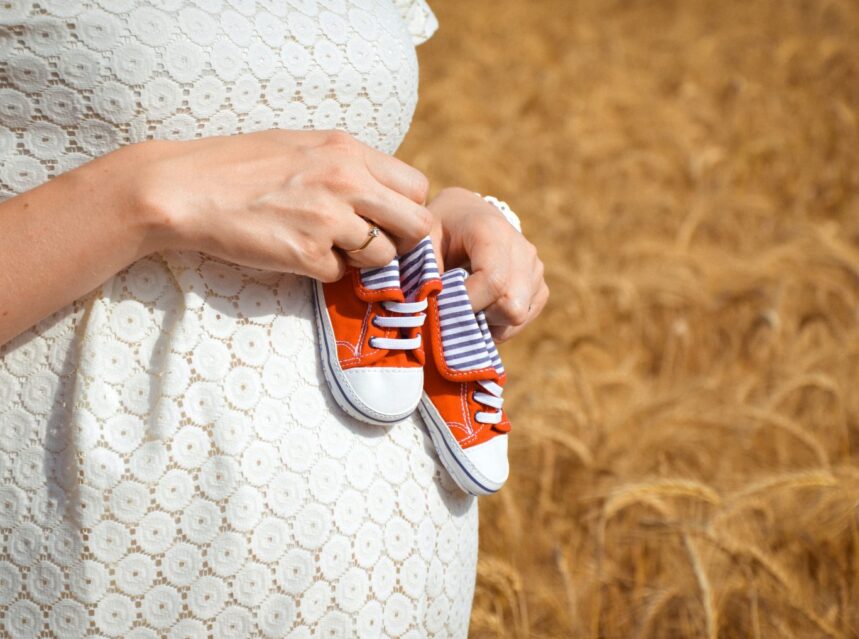What to Expect in The First Trimester of Pregnancy?

Pregnancy is a memorable and life-changing journey for every woman. A lot happens during this period. So during the first trimester of pregnancy, you might feel overwhelmed and confused, which is totally natural!
New pregnancies can be a bit challenging, especially if you’re having a baby for the first time. Your body goes through many incredible changes.
To deal with it, you have to modify your lifestyle accordingly.
Stepping into motherhood doubles your responsibility to take care of your physical and mental wellbeing. You have to ensure you’re doing everything to welcome a healthy baby.
Since it’s a crucial time for new moms, I’ve created this handy guide for you to learn what to expect during the first trimester of pregnancy.
Here you’ll find useful tips on how to prepare your mind and body in the initial pregnancy months. Plus, helpful suggestions on how to make your pregnancy journey unforgettable!
Quick Navigation Hide
- What is the First Trimester of Pregnancy?
- What are the Symptoms of the First Trimester of Pregnancy?
- How to Prepare for the First Trimester Ultrasound?
- What to Expect in The First Month of Pregnancy?
- What Happens to Your Body During the First Trimester?
- What Happens To Your Baby During the First Trimester?
- What is a High-Risk Pregnancy and How to Deal With It?
- What Problems You Might Face During the First Trimester of Pregnancy?
- How Can You Stay Healthy During the Pregnancy’s First Trimester?
- What Foods Should You Eat During Your First Trimester?
- What Foods You Should NOT Eat During Your First Trimester?
- Tips For Joyful First Trimester Pregnancy Journey
What is the First Trimester of Pregnancy?
A full 9-month pregnancy lasting for about 40 weeks, is divided into three months. Let’s take a brief look at the 3 types of trimesters and what you can expect during the early to final days of pregnancy.

- First trimester (Week 1 to 12): Starts on the first day of your last period. At this time the egg has started to grow and by the end of this quarter, it’ll be a fetus. This is the most crucial time of all trimesters.
- Second trimester (Week 13 – 26): The fetus is now growing so you’ll start gaining weight and the belly will look bigger. This period is comparatively easier than the first because most initial pregnancy symptoms might disappear.
- Third trimester (Week 27 – end of pregnancy): It can be a painful time for pregnant women due to sudden cramps and backaches. You might feel the fully grown baby move around. There may be episodes of anxiety about labor or upcoming motherhood challenges.
In short, the pregnancy’s first trimester is the time when the egg has begun to fertilize and the fetus formation is in its initial stages. With every week, the baby grows a bit more and your body prepares for the phases ahead.
During these days, you might experience many weird changes. Hormonal activity during the early weeks is quite crazy. Be ready for unexplained cravings and strange habits!
These 3 months are critical. The life growing inside you is delicate and requires enhanced care. Unfortunately, almost 80% of the miscarriages happen during the first trimester – a staggering number!
So stay comfortable – both physically and mentally – to ensure your baby remains healthy as well.
What are the Symptoms of the First Trimester of Pregnancy?
While some symptoms of early pregnancy are similar, the first trimester of pregnancy brings a different experience for every new mom-to-be.
It all depends on your lifestyle and habits. The healthier your lifestyle, the more likely you’ll have minimal complications.
In the early days of conception, our body goes through numerous physical and emotional changes. It’s impossible to ignore the telltale symptoms of first trimester pregnancy.
Some of the signs of early pregnancy in the first trimester are:
- Missed period
- Swelling and pain in breasts
- Blue veins appear in breasts
- Nausea or morning sickness
- Tiredness
- Strange food cravings at odd times
- Increased need to pee
- Constipation or diarrhea
- Sweating or night sweats
- Feeling hot
- Acid reflux after eating heavy foods
✅ Strange cravings
✅ Missed period
✅ Swelling in breasts
✅ Digestive problems
How to Prepare for the First Trimester Ultrasound?
The signs of early pregnancy will indicate when it’s time to go for an ultrasound. As soon as you start noticing the symptoms of pregnancy in the first few weeks, find a trustworthy gynecologist or obgyn.
Selecting a good professional obgyn is a task itself. My suggestion would be to discuss it with your friends and family.
During the initial visit, the obgyn will conduct a thorough health check-up. They will check your weight, blood pressure, and inquire about existing medical conditions. They may also ask about your sexual activity and even conduct a breast exam.
Then they’ll likely recommend a first trimester ultrasound to confirm your pregnancy. Doctors usually do an ultrasound during the first trimester of pregnancy between 6 to 8 weeks.
It’s a necessary step of prenatal care to determine how many fetuses you have and the location and size of the angel in your belly.
The ultrasound is also helpful in assessing if you’re at risk of serious pregnancy complications or infections.
Through ultrasound, they can even gauge how far off you are in pregnancy – which can at times be useful if you’re unsure about the time of conception.
All this info can help you take immediate precautions for the wellbeing of your baby early on.
What to Expect in The First Month of Pregnancy?
Probably the biggest concern for women who have conceived for the first time is how the first month of pregnancy would feel like.
- Many women tend to sleep longer in the beginning of their pregnancy journey. Others might experience some anxiety, leading to insomnia.
- Headaches and pressure in the eyes is also possible during this time. Some soon-to-be moms have blocked noses or sinus problems.
- An early symptom of the first trimester of pregnancy is skipping your period.
- Watch out for morning sickness and nausea, as these are the most common issues in the initial weeks.
- There may also be occasional cramps or bloating in your tummy, lasting for a few moments. If the pain doesn’t go away easily, it could be a sign of something serious.
- Some women often feel easily irritated or angered. Mood swings are a given because of all the crazy hormones.

- Be careful about what you eat in the first trimester. Your diet must include fruits and veggies that strengthen your immune system and prevent the risk of pregnancy infections. Avoid fried or processed foods and rely on raw or natural stuff.
These 4 weeks are extremely delicate for the little angel in your belly. Any slight mistake could lead to miscarriage and severe blood loss.
- One of the early pregnancy complications is ectopic pregnancy during which the embryo starts growing outside the uterus. It needs to be taken care of immediately.
- Drinking lots of alcohol or exposure to drugs can affect your baby with teratogens that lead to fetal deformities.
In short, you need to make certain changes in your lifestyle to ensure your baby grows healthy and strong.
What Happens to Your Body During the First Trimester?
Your body has to create a safe environment for your little one to grow. So you’ll go through various unexplainable changes.
Since the blood amount increases during the first trimester of pregnancy, the heart rate will shoot up too. Usually, it’s about 10 to 20 beats per minute. In some women, high blood pressure could be a cause for concern.
You might also be prone to acne. That’s because of excess oil production by the androgen hormone.
The good thing about the early days of pregnancy is a natural skin glow, also known as “pregnancy glow.” It’s accompanied by a natural flush in the cheeks from blood circulation.
You may or may not gain some weight in these weeks. Keep doing simple prenatal exercises to prevent backaches later on.
White and sticky vaginal discharge in the pregnancy’s first trimester is quite common too. This is a good thing as it prevents the risk of vaginal infections.
What Happens To Your Baby During the First Trimester?
While your little one is the size of grain in the first month, the growth is comparatively faster during the later days of the first trimester of pregnancy
After about 5-6 weeks of conceiving, your baby gets a heartbeat which can be detected with an ultrasound. The little angel will now have blood circulation and blood cells formation.
Simultaneously, the brain, spinal cord, stomach, and intestines are completely formed by the end of pregnancy’s first trimester.

The limb growth begins in the second month as mini bumps for arms, legs, hands, feet, fingers, and toes.
In the final days of the first trimester of pregnancy, your baby grows about 4 inches in length and becomes a fetus. You might even notice a belly bump!
What is a High-Risk Pregnancy and How to Deal With It?
A high-risk pregnancy means you’re prone to complications that could endanger your health.
The first trimester of pregnancy is the most delicate time for you and your growing baby. You may get infections and be in danger of miscarriage if you don’t take care during pregnancy’s first trimester.
Here are some causes of pregnancy complications that you might want to discuss with your obgyn:
- Too high or too low weight of the mother
- High blood sugar levels
- High blood pressure
- Cardiac diseases such as arrhythmia or heart attack signs
- Respiratory diseases like asthma
- Drinking or smoking
- STDs, STIs, and other dangerous infections
- Reproductive issues such as uterine fibroids or heavy periods
- Age 35+ years at the time of conceiving
- Age less than 20 years at the time of conceiving
- Being pregnant with more than one fetus
Being at risk of pregnancy complications isn’t the end of the world!
You will only need extra care and supervision from a professional. And for that, you may need to visit the doctor more often. Once you’re aware of the perils, you can make some healthy changes in your lifestyle.
Your doctor will likely guide you on how to ensure a safe pregnancy journey as well. If needed, you might be asked to take medicines to reduce such problems.
What Problems You Might Face During the First Trimester of Pregnancy?
Pregnancy’s first trimester for new moms can be a challenging time. A lot happens and it can be difficult to navigate these changes on your own.
Here are a few problems that you might want to take precautions or seek support for:
- Back pain:
Back pain during the first trimester of pregnancy is common because of the softening of the ligaments, preparing you for labor. As a result, it puts pressure on your lower back and hips, resulting in backaches.
Tips: Adjusting your posture, sleeping on the sides, and cold massages can help relieve the pain.
- Cramps:
Also expect uterus cramps in the first trimester of pregnancy. They are somewhat similar to period cramps and are caused by hormonal changes. First trimester pregnancy cramps target the vagina, pelvis, lower abdomen, and back. These cramps are nothing to worry about unless they last for too long.
Tips: Avoid putting pressure on your belly. Stretching prenatal workouts might help as well.
- Bleeding:
Bleeding in the first trimester of pregnancy is yet another huge problem. Every 1 in 5 women experiences light bleeding and spotting, usually after the 1st and 2nd week of conception because of the internal blood vessel adjustments.
It should last for about 1 to 2 hours and not more. Seek your doctor’s advice ASAP if the bleeding won’t go away or it’s too much.
Tips: Use pads to soak up the blood. Avoid having sex as it can aggravate the bleeding in the first trimester. Take lots of rest.
- Headaches:
First trimester pregnancy headaches and fatigue are also quite common. They’re often accompanied by stress or pressure in the eyes.
Almost every woman experiences this because of increased blood volume and hormonal changes. The good news is that these headaches will stop after the first trimester of pregnancy.
Tips: Stay hydrated and rest in a cool space. Avoid taking stress. Try out relaxing therapies.

- Insomnia:
Hormonal imbalance also affects your sleep cycle. Exhaustion and high progesterone are two leading causes of insomnia in the first trimester of pregnancy.
Surprisingly, women feel extra sleepy during the first trimester of pregnancy. But restlessness is still a common problem.
Tips: You can avoid sleepless nights by drinking lots of water and reducing coffee intake. Plus, make sure you have a good mattress.
- Constipation and diarrhea:
The first trimester of pregnancy might create issues with bowel movements. Since your body is going through numerous changes, it’s possible to experience diarrhea or constipation.
First-trimester pregnancy diarrhea or constipation isn’t serious unless it lasts for more than 3 days. You should consult a doctor if it’s not going away.
Tips: If you’re getting bowel issues from medicines, avoid them. Also, don’t eat foods that could mess up digestion.
How Can You Stay Healthy During the Pregnancy’s First Trimester?
For good baby health, you need to take the necessary steps to remain healthy as well so little one can thrive in a nurturing environment.
Here are a few do’s and dont’s of the first trimester of pregnancy that you should know about.
Do’s:
- Find a prenatal professional:
You need regular checkups during your pregnancy to ensure the healthy growth of your baby. Find a pro obgyn for your regular checkups. If you don’t know any healthcare provider personally, contact your friends and family for suggestions. Try sticking to the same doctor from the first trimester of pregnancy till the last.
- Start taking supplements:
Nutritional boost is important for a smooth pregnancy and your baby’s growth. Folic acid, calcium, vitamin D, and iron are among the most necessary supplements in the pregnancy’s first trimester. Consult your obgyn before taking any multivitamins.
- Exercise regularly:
A regular prenatal exercise routine is crucial for a healthy pregnancy journey. It can further prepare your body to accommodate the growing baby and enhance your flexibility for labor. Plus, it helps you with the first trimester back pain and improved posture.
- Stay hydrated:
During pregnancy, your body produces more blood, forming amniotic fluid around your baby. This naturally makes you pee often and hydration becomes essential. Drinking sufficient water also removes toxins from the body and improves digestion. So make sure you get at least 8 to 12 glasses daily.
💡 Health tip: Drink LOTS of water during pregnancy – it’ll help with proper baby growth.
#pregnancy #motherhood
- Eat a healthy diet:
Try consuming natural and raw fruits or veggies during pregnancy. Many crucial minerals in natural foods help with the baby’s growth. You can also check out some healthy foods to eat during the first-trimester pregnancy below.
- Get enough rest:
Hormonal imbalance in the first trimester of pregnancy can be tricky to maneuver. Mood swings, nausea, and insomnia are common first trimester pregnancy symptoms. The best way to deal with them is by getting sufficient sleep.
Dont’s
- No strenuous exercise:
Exercise is necessary during the first trimester of pregnancy. But make sure you don’t overdo it as intense exercise can harm your belly and the baby. Select easy prenatal poses and workouts to help with flexibility and pain.
- Drink less caffeine:
Limit your caffeine consumption during pregnancy. Caffeine negatively affects your baby by increasing the risk of miscarriage. Try going through the day in just one or two cups of coffee. Avoid sodas and other unhealthy drinks altogether.
- Quit smoking and avoid alcohol:
These two notorious drugs are really harmful in the first trimester of pregnancy. Quit these habits and instead switch to healthier alternatives.
- Don’t take hot baths:
Taking hot baths is also forbidden during pregnancy’s first trimester. High body temperature reduces blood flow to the growing baby.
- Don’t lift heavyweights:
Heavy weight lifting and excessive bending further raise the chance of miscarriage and serious injuries during the first three months of pregnancy.
What Foods Should You Eat During Your First Trimester?
A healthy first trimester pregnancy diet nourishes your body as well as your baby. Good food ensures a healthy, safe, and sound journey for nine months.
Here’s a list of foods for the first trimester of pregnancy that will help your baby grow and prevent the risk of diseases.

- Baked sweet potatoes
- Chicken and turkey
- Bran cereals
- Leafy greens like kale and broccoli
- Bran muffin
- Eggs
- Dried fruits
- Fortified cereals
- Low-fat milk
- Rice
- Cantaloupe
- Avocado
- Orange juice
- Yogurt
- Tomatoes
- Berries
- Apples
- Bananas
- Garlic
- Whole wheat bread
What Foods You Should NOT Eat During Your First Trimester?
Eating the perfect first trimester diet in pregnancy can be challenging, especially if you’re on your own. Focus on prepping foods that are nourishing and won’t cause digestive problems.
Let’s go through the worst first trimester foods that you should avoid at all costs:
- High mercury fish
- Cod liver oil capsules
- Coffee and sodas
- Unpasteurized milk and cheese
- Raw eggs
- Hot dogs
- Undercooked meat
- Fat meat
- Raw fish
- Processed junk foods like fries and burgers
Tips For Joyful First Trimester Pregnancy Journey
With the right guidance and support, the challenges during the first trimester of pregnancy can be easy to handle. Here are some effective tips for first trimester pregnancy that will help you deal with the pregnancy symptoms.
- Gulp down soothing drinks: A tablespoon of honey in a glass of water will keep you hydrated and treat nausea.
- Chew sugarless gum: Chewing gum produces saliva and thus relieves heartburn during pregnancy.
- Practice relaxing techniques: Yoga, meditation, and other therapeutic techniques can reduce the panging first trimester pregnancy headaches.
- Stretch and massage: Muscle stretching, light exercises, and massages have proven effective for first trimester pregnancy cramps.
- Eat BRAT diet: BRAT (banana, rice, apple sauce, toast) diet helps with first trimester pregnancy diarrhea. These low-fiber foods improve the digestive system.
- Buy a donut-shaped pillow: A donut pillow adapts to your body shape perfectly while sitting. Thus, it reduces stress on your rectal and pelvic areas.
- Drink ginger tea: Ginger is being used for years to treat painful first trimester pregnancy symptoms. Ginger tea naturally relieves nausea and morning sickness.
- Eat yogurt and drink protein shakes: Low-fat yogurt and protein shake help relieve heartburn during pregnancy.
- Eat small meals frequently: Instead of eating heavy meals at once, consume several small portions throughout the day. This will prevent digestive issues and nausea.
I hope this article helped you better understand how to prepare for the first trimester of pregnancy. Try these handy tips and learn how you can enjoy a healthy pregnancy journey with your little angel.
References:
- https://www.acog.org/womens-health/faqs/bleeding-during-pregnancy
- https://www.healio.com/news/primary-care/20200824/no-caffeine-consumption-safe-in-pregnancy-study-finds
- https://www.marchofdimes.org/pregnancy/foods-to-avoid-or-limit-during-pregnancy.aspx
- https://www.ncbi.nlm.nih.gov/pmc/articles/PMC5689234/
- https://www.ncbi.nlm.nih.gov/pmc/articles/PMC5682869/
- https://www.ncbi.nlm.nih.gov/pmc/articles/PMC4935047/


